#Olive Custance
Explore tagged Tumblr posts
Text
Masked dancers in the Dance of Life We move sedately...wearily together, Afraid to show a sign of inward strife, We hold our souls in tether.
We dance with proud and smiling lips, With frank, appealing eyes, with shy hands clinging. We sing, and few will question if there slips A sob into our singing.
Each has a certain step to learn, Our prisoned feet move staidly in set paces, And to and fro we pass, since life is stern, Patiently, with masked faces.
Yet some there are who will not dance, They sit apart most sorrowful and splendid, But all the rest trip on as in a trance, Until the dance is ended.
Masquerade by Olive Custance
2 notes
·
View notes
Text
SCRSAMINGHHHGG



I WANT THIS I WANT THIS I WANT THIS I WANT THIS I WANT-
8 notes
·
View notes
Text
For this 2nd day of Pride Month I decided to talk about a woman I mentionned yesterday in the post about Renée Vivien (that you should absolutely read by the way, Renée Vivien is amazing) :
Natalie Clifford Barney !
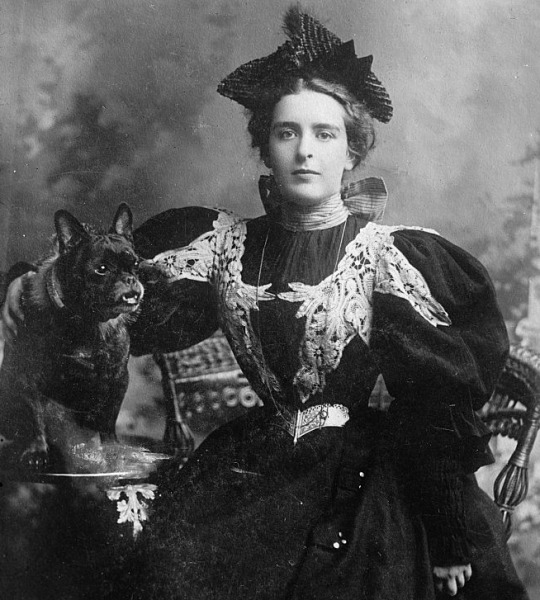
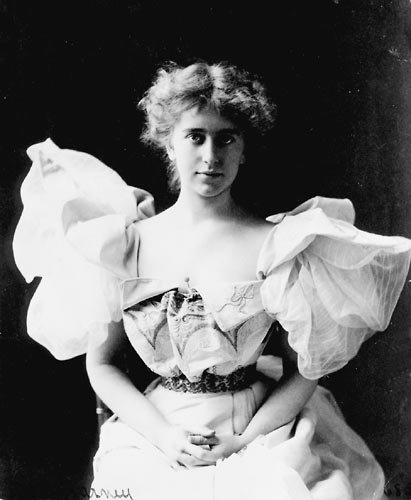
I talked about her to say that she's had a love story with Renée Vivien, but that's not the only thing she's done.
Natalie was born in 1876 in the United States and died in 1972 in Paris, at the age of 95. Writer and poet, she was the first woman to use the word "lesbian" in her writings (in this case a collection of poems, published in 1899), instead of the word "tribade" (it's another word for lesbian in french) or simply "homosexual". The word lesbian back then was even more taboo than it is today, so you can imagine how important this fact was (and still is).
She was also famous for the parties she organised: she held a literary salon which she wanted to turn into the "new Mytilene". She invited the female artists, writers and intellectuals of her time, in response to the all-male Académie Française, and they all spent whole afternoons and evenings in the flat of the wealthy American.
Natalie never tried to hide her homosexuality. As she said in a sentence that quickly became her most famous one,
"Why would anyone blame me for being a lesbian ?"
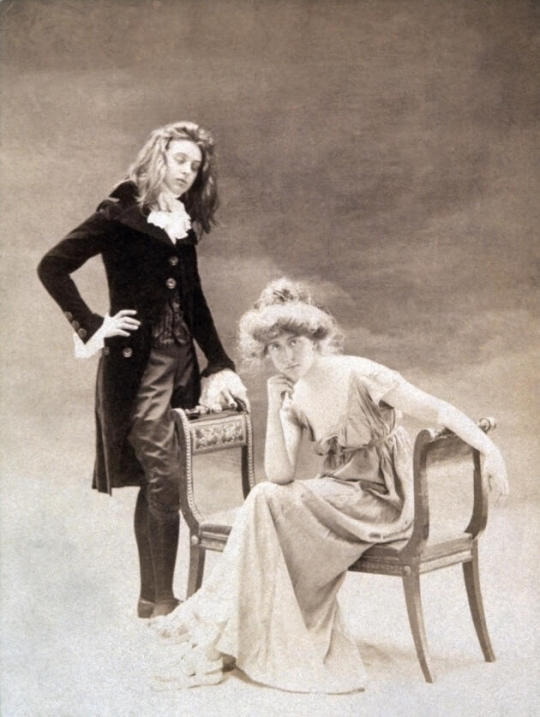
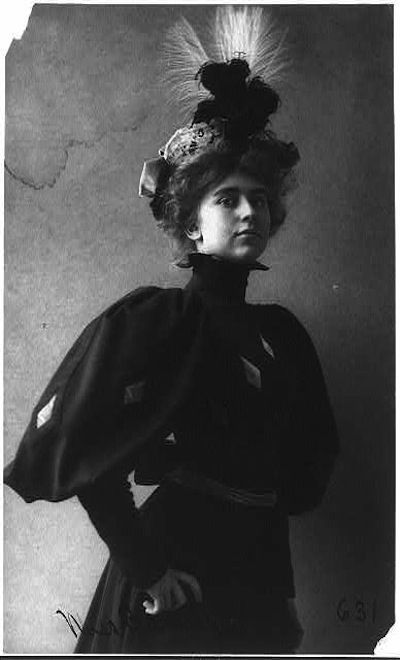
(Yes, that's her with Renée Vivien)
Natalie's mother (a renowned artist) and her tutor awakened her interest in the French language at an early age, and when she was a little older, she was sent to a school in France; thanks to this, she spoke French fluently and without an accent, and developed a soft spot for this country.
Natalie was 12 when she realized she was a lesbian, and decided right away to "live in the open, without hiding from anyone".
Hee first known relationship was with Liane de Pougy, a famous dancer of the time (whom she cheated on with many women). Natalie wrote about this love story in her collection Quelques portraits, sonnets de femmes. ("Some portraits, sonnets of women"). Liane wrote about it in her novel "Idylle sapphique", which so fascinated the French public that it had to be reprinted sixty times in the same year, with people torn between admiration and scandal. The two women eventually parted ways, however, due to Natalie's infidelities and Liane's "debauched lifestyle" (in Natalie's words).
As I said, this book caused a huge scandal. Natalie was forced to return to the United States, where her father burned all her writings he could find, and tried to marry her off. However, she categorically refused to obey him, and faced with her stubbornness, her father gave up, and Natalie returned to Paris, where she had a lot of lovers. Among these lovers, there's Renée Vivien (probably the most important, since Natalie never accepted their breakup and tried to get Renée back until Renée died at 32) Lucie Delarue-Mardrus, Colette, Emma Calvé, Olive Custance, Henriette Roggers and many others.
In 1902, on the death of her father, Natalie Clifford Barney inherited a large fortune and was able to rent a house in Neuilly-sur-Seine, where she gave parties that became the talk of the town.
In 1910, she moved into a house at 20 rue Jacob ; for nearly sixty years, this house was the setting for her famous "Fridays", one of the last influential literary salons. A LOT of famous people went there. Like really. The complete list is on Wikipedia if you're curious, and here's a screenshot with some examples :
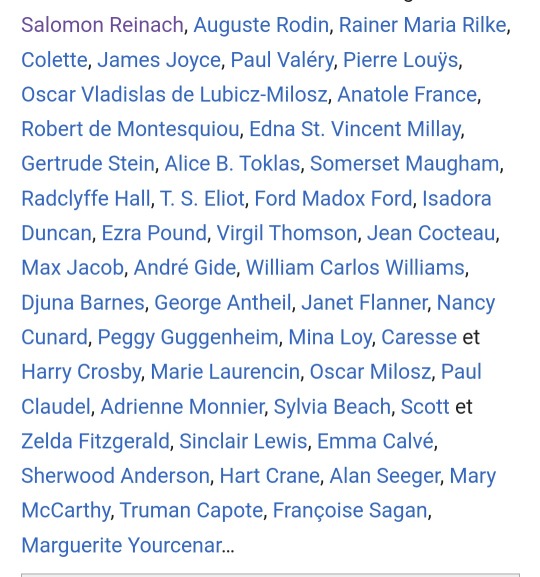
Marie Skłodowska-Curie went there. Albert Einstein went there. Apollinaire and Proust went there. Oscar Wilde went there. That's cazy to me!
She's had other lovers, like Elisabeth de Clermont-Tonnerre, but her greatest love story was with the painter Romaine Brooks, with whom she had a relationship similar to that of a married couple from 1914 to the end of her life. Of course, this didn't stop her from cheating on Romaine with other women: Natalie was known for her infidelities, believing that polygamy was necessary for a couple's survival, although she claimed that this didn't stop her from being deeply in love with Romaine. She cheated on her for example with Oscar Wilde's niece Dolly, and Nadine Huong, whose story I'll tell one day because it's so interesting!
She spent the years of the Second World War in Italy, and later returned to France to find her second home, which she shared with Romaine Brooks, destroyed. In 1949, she reopened her salon (which started to welcome more and more famous actors and actresses on top on everyone else).
Nothing much happened for the rest of his life. She never left Romaine Brooks (despite continuing to have affairs with a host of other women) and died in Paris in 1972, aged 95.
Natalie Clifford Barney's work and life were very important not only for culture itself, but also for the lesbian community. She made a major contribution to lesbian visibility, opened many minds, helped normalize (even if we still have a long way to go) homosexuality and, above all, helped many lesbian women accept themselves, understand that they were not alone and live the life they deserved.
The influence of her works and her salon on culture, literature, cinema, theater and even science is immense and deserves to be recognized. We should be talking about her much more than we are!
Here's some of her poems with an english translation :
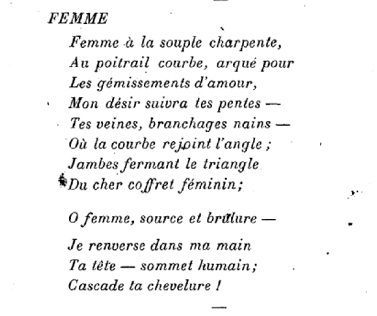
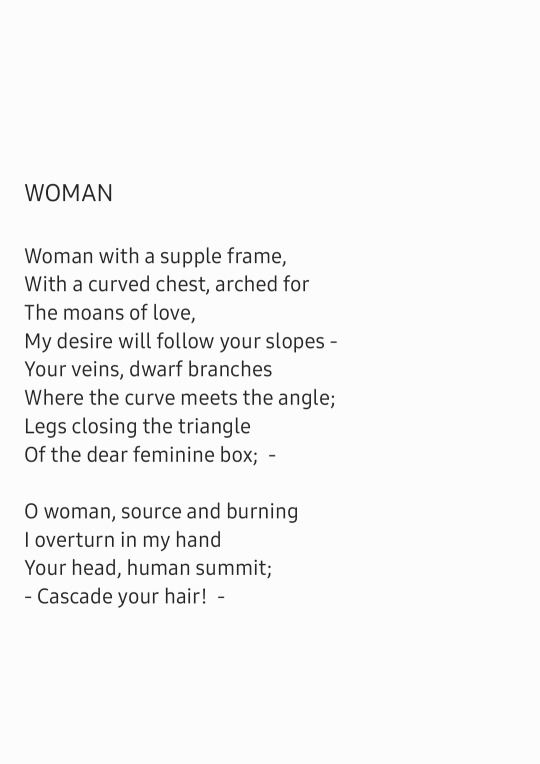
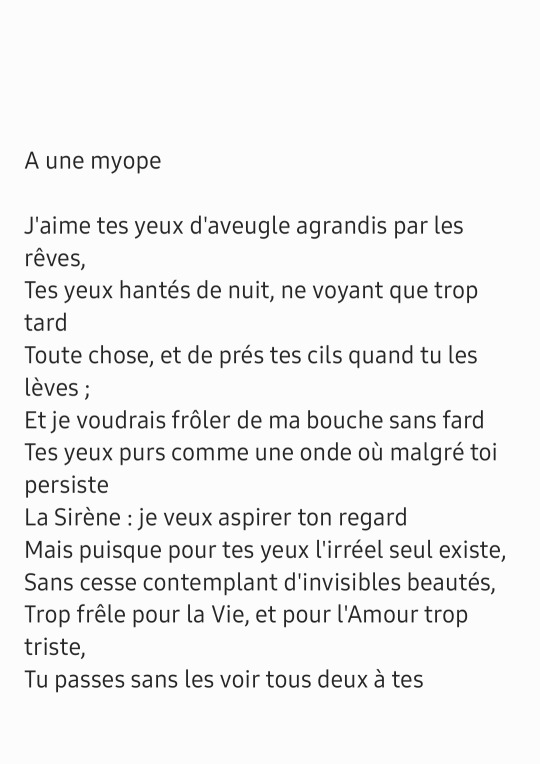
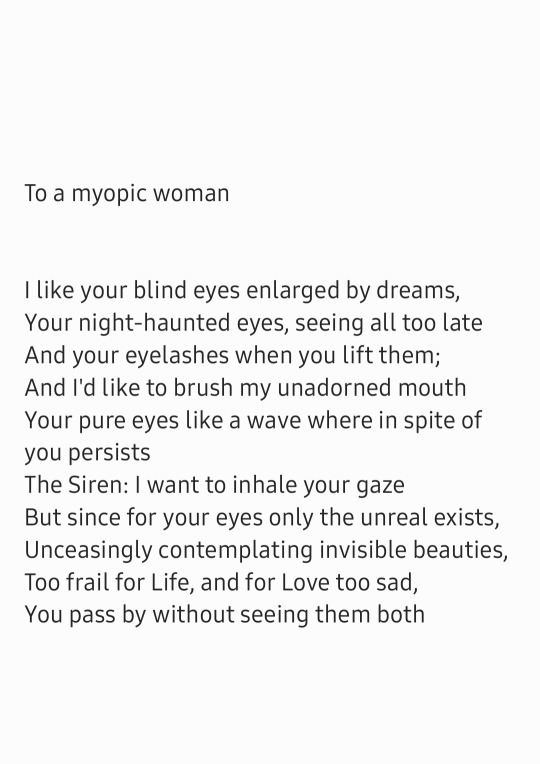
And she's written loads of other stuff that I really recommend you read! She was an interesting woman who wrote interesting things. Look her up on Google and read her writings and her life!
Anyway, that's it! Sorry for posting so late, and see you tomorrow for the 3rd lesbian pride post 🏳️🌈
#lesbian#lesbian pride#pride#pride month#lgb#lgbt history#lgbt#female homosexual#female homosexuality#female history#women's history#herstory#lesbian history#poetry#french poetry#poésie française#poésie#american writer#natalie clifford barney
134 notes
·
View notes
Text
Lorde Alfred Douglas (1870-1945).
Poeta, tradutor e prosador inglês.
Segundo seu biógrafo, G. A. Cevasco: "Atlético e bonito, popular entre os colegas, ele se dedicou mais a escrever versos do que aos estudos (não se formou).
Enquanto estudava em Oxford, ele editou um jornal de graduação, The Spirit Lamp, que carregava um subtexto homoerótico, e conheceu Wilde, com quem iniciou um relacionamento próximo, mas tempestuoso. O pai de Douglas, o Marquês de Queensberry, desaprovou veementemente o caso e decidiu humilhar Wilde, acusando-o publicamente de homossexualidade. Wilde o processou por difamação criminal, mas algumas de suas anotações íntimas foram descobertas e ele foi devidamente preso. Ao ser libertado, ele viveu brevemente com Douglas em Nápoles, mas eles foram separados quando Wilde morreu em 1900.
Douglas casou-se com Olive Custance em 1902 e eles tiveram um filho. Convertendo-se ao catolicismo romano em 1911, ele repudiou abertamente a homossexualidade de Wilde e, em uma revista altamente católica, Plain English, expressou opiniões que eram abertamente antissemitas, embora rejeitasse as políticas extremas da Alemanha nazista. Ele também foi preso por difamar Winston Churchill por alegações de má conduta durante a guerra.
Douglas escreveu vários livros de versos, alguns deles classificados no gênero homoerótico Uraniano . A frase "O amor que não ousa falar seu nome" veio de um dos poemas de Douglas, embora seja amplamente atribuída erroneamente a Wilde.
Douglas foi descrito como mimado, imprudente, insolente e extravagante. Ele gastaria dinheiro com homens e jogos de azar e esperava que Wilde contribuísse para financiar seus gostos. Eles frequentemente discutiam e se separavam, mas também sempre se reconciliavam.
Douglas morreu de insuficiência cardíaca congestiva.










Lord Alfred Douglas (1870-1945).
English poet, translator and prose writer.
.
According to his biographer, G. A. Cevasco: "Athletic and handsome, popular with his classmates, he applied himself more to writing verse than his studies (he did not take a degree).
.
While studying at Oxford, he edited an undergraduate journal, The Spirit Lamp, which carried a homoerotic subtext, and met Wilde, with whom he started a close but stormy relationship. Douglas’s father, the Marquess of Queensberry, disapproved strongly of the affair, and set out to humiliate Wilde, publicly accusing him of homosexuality. Wilde sued him for criminal libel, but some of his intimate notes were discovered, and he was duly jailed. On his release, he briefly lived with Douglas in Naples, but they were separated by the time Wilde died in 1900.
.
Douglas married Olive Custance in 1902, and they produced a son. Converting to Roman Catholicism in 1911, he openly repudiated Wilde’s homosexuality, and in a High-Catholic magazine, Plain English, he expressed views that were openly anti-semitic, though he rejected the extreme policies of Nazi Germany. He was also jailed for libelling Winston Churchill over claims of wartime misconduct.
.
Douglas wrote several books of verse, some of it classified in the homoerotic Uranian genre. The phrase "The love that dare not speak its name" came from one of Douglas’s poems, though it is widely misattributed to Wilde.
.
Douglas has been described as spoiled, reckless, insolent and extravagant. He would spend money on men and gambling and expected Wilde to contribute to funding his tastes. They often argued and broke up, but would also always reconcile.
.
Douglas died of congestive heart failure.
[Submission]
514 notes
·
View notes
Text
0 notes
Photo

https://en.wikipedia.org/wiki/Olive_Custance
4 notes
·
View notes
Text
“I did not for a moment intend to put up with less love and admiration from a girl than I had been in the habit of getting […] from innumerable male friends”
( Lord Alfred Douglas 1931: 214-215).

8 notes
·
View notes
Text
« … L’heure sonna enfin… Elle prit mon bras… Le frôlement de ce corps gracile m’enivrait. La conscience de ma force me grandissait à mes propres yeux. Je me sentais l’orgueil attendri de l’être qui domine et qui protège. »
— Renée Vivien, Une Femme m’apparut, 1905 (Nouvelle édition)
#Renée Vivien#Une Femme m’apparut#Une Femme m’apparut 1905#p. 96#Romans#littérature lesbienne#lesbian literature#Olive Custance
6 notes
·
View notes
Text
Never not thinking about Olive Custance

😳😳

AAAAAAAAAH

Fairy Prince and Boyish Page, BYEEEE
She is literally the reason the word Fairy Prince is in my vocabulary I'm obsessed with her.
6 notes
·
View notes
Text
The trees look sad—sad—I long for the leaves, Green leaves that shimmer—and shelter the nests that the song-birds make. The earth is glad—glad—but my spirit grieves. Break forth from your buds and awake O! leaves!
I remember the woods last year and the thick fresh leaves! How they fluttered and flickered and sighed, rustled and quivered all day… I almost fancy I hear their song to the breeze, The fickle breeze that faltered and wavered, but would not stay. I long for the leaves!
I remember the sun-laced grass, where their shadows were flung In a tangled web as they trembled—trembled a-tilt on the bough, Now! they are fallen, alas! from the trees where they hung, Withered, wind-wafted away…O! where are they now, The leaves?
A Lament for the Leaves by Olive Custance
2 notes
·
View notes
Text
Bosie: so I said that I'm a switch, right, and now all these ladies are coming out of the woodwork saying 'hey I got a strap on and a dog collar with your name on it' and I'm like
Bosie:...
Bosie: you put my nAMe ON It?🥰🥰🥰
#tiktok#literature memes#history memes#lgbt memes#memes#please understand#lord alfred douglas#bosie douglas#Olive Custance#oscar wilde#the picture of dorian gray#tpodg#literature#biseuxal#lgbtq#Olive topped him
48 notes
·
View notes
Photo

Une Femme m’apparut, 1904
15 notes
·
View notes
Photo

Olive Custance (deceased)
Gender: Female
Sexuality: Bisexual
DOB: 7 February 1874
RIP: 12 February 1944
Ethnicity: White
Occupation: Poet, writer
#Olive Custance#lgbt history#bisexual history#bisexuality#lgbtq#female#bisexual#1874#rip#historical#white#poet#writer#popular#popular post
121 notes
·
View notes
Photo

Poem written for Natalie Clifford Barney in 1902.
#not enough olive custance material on this site and i am fuming#natalie barney#olive custance#the white witch#i love them so much
111 notes
·
View notes
Quote
I have bowed down Before the light of beauty all my life, And now, Oh poet passionate and brave, Oh lover with the beautiful sad face, Like a shy child I bring you all my songs.
Olive Custance, dedication ‘To my husband’ in her volume of poetry The Blue Bird (1905)
18 notes
·
View notes
Text
How flower-like are the smiling lips so many have desired,
Curled lips that love’s long kisses have left a little tired.
— Olive Custance, "The White Witch"
6 notes
·
View notes